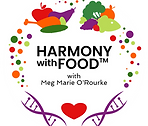Why "RD" By My Name Matters
- Meg ORourke, RD-LDN
- Feb 11, 2018
- 2 min read
Updated: Sep 26, 2020
March is National Nutrition Month, and the 11th was Registered Dietitian Day—a day I’m extremely thankful exists,

not because I want praise, but because I believe it’s important for you to know the differences between registered dietitians (RDs) and the myriad other “nutritionists” who flood the media with misleading health and dietary advice.
I’ve been working as an RD since 1991, and it’s a distinction I’m proud to hold. To be an RD, you must have a degree in nutrition, dietetics, public health, or a related field and have completed an internship and passed a certification exam: I earned a Bachelor of Science in nutrition and dietetics from Saint Joseph College in West Hartford, CT, and completed my postgraduate internship at the University of Connecticut’s School of Allied Health. RDs must also obtain 75 continuing education credits every five years, staying up-to-date on the latest scientific research and findings.
My education means that I’m able to translate the science of nutrition into practical, time-tested solutions for healthy living. It means I’m qualified to help clients safely and effectively lose weight, manage chronic disease, eat right to get pregnant and during pregnancy, address eating disorders, and navigate food allergies and intolerances.
Unfortunately, anyone can label himself/herself as a “nutritionist,” regardless of education. That means that unless you’re reading a nutrition article written by or watching an interview featuring an RD—the only recognized nutrition qualification in the US—you might be getting advice from someone who isn’t qualified to give it. Their “factual information” may be nothing more than a cleverly disguised marketing pitch for an unproven weight-loss supplement or fad diet, or based solely on their personal dietary practices, not science.
I applaud you for involving me as an RD in your health journey, and I further encourage you to tune out the advice of self-proclaimed nutrition experts. I also hope you’ll spread the word to friends and family to seek out their nutrition information and dietary guidance (whether in person or via books, websites, you name it) from a reliable RD. My fellow RDs and I are here to help you separate nutrition fact from fiction and avoid what can be, at best, exaggerations and, at worst, dangerous misinformation.
I also urge you to browse through the online resources created for Nutrition Month and RD Day. I particularly recommend taking at look at the “Good Nutrition Reading List” for a curated selection of nutrition-based books and websites you can trust. I’m familiar with several of the suggestions and especially enjoyed reading Nancy Clark’s Sports Nutrition Handbook, which is listed under “Sports Nutrition.” I found it very informative, easy to understand, and helpful for those who exercise regularly.
National Nutrition Month logo from Academy of Nutrition and Dietetics. Photo of me taken at the ribbon cutting ceremony for Hope & Main, Rhode Island's first kitchen incubator, of which I'm a BIG supporter. Learn more at makefoodyourbusiness.org.




.png)


























Comments